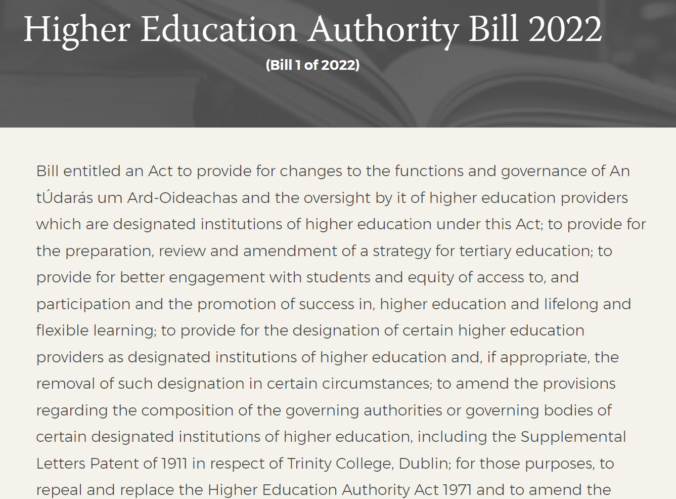

Myth: The HEA Bill 2022 will mean that the government will invest in mental health and other areas.
Truth: The bill itself does not contain any provisions for mental health funding. The “Student Mental Health and Suicide Prevention Framework”, already published in 2020 October will fit in to provide for it under section 37 of the legislation. However, in line with government policy of consistently targeting mental health funding during austerity and in 2012, 2016, and a general continued sharp decline in the health budget from 16% in the 80s to 6% in 2020, we do not think the government will do anything differently and step up under the new bill. There is a stated need of 28 million euros for an appropriate student-counsellor ratio (USI – Pre-Budget Submission 2022), in response to which the government provided only 5 million euros.

Myth: The HEA Bill 2022 and the funding plan for universities are separate issues.
Truth: You can’t have one without the other. The HEA Bill 2022 contains the framework that will distribute funding. In the funding plan, there is no commitment to reducing the student fees as the USI pointed out and also, the funding is less than half of what our universities need as per the 2016 Cassels Plan.

Myth: The HEA Bill 2022 will increase student representation on governing bodies.
Truth:
In earlier drafts of the bill, over 60% of HEIs will lose student representation on governing bodies, as the bill prescribes 2 representatives, including Trinity, UCD, UCC and others.
However, on the 21st of June Tuesday 2022, it has been confirmed that Minister Harris will support an amendment that increases the number to 3, changing the situation. It is not ideal, as we would have asked for 2-4, but this way less HEIs wil lose student representation. This is a win and we welcome this amendment to the bill.


Myth: The HEA Bill 2022 will mean that the USI will sit on the HEA Board, therefore democratizing education.
Truth:
The USI has been promised that they will now sit on the HEA Board, but it is just one vote against a lot of apparatchiks provided for by the Minister who will always vote against student interests. When have they ever listened to the USI in committees?
As per section (16) (2) (b), one of the members appointed to the HEA Board will be from a nomination of a student from the national student union. However, they can be rejected. The 12-member HEA Board will be appointed by the Minister as per section (16) (a), and so it is his Board, and he will control its direction and fulfil the aims set out in section 8 and 9 (e.g. equality, diversion and inclusivity). The spirit of these aims will be controlled by the government and will not be fulfiled.
Equally for all other matters as outlined here where the HEA’s scope of power is extended, the Minister is influential as he appoints the members of the HEA Board. The HEA Board is by no means democratic, and does not guarantee democratic representation for trade unions, students and staff.
For a lot of matters, therefore, we will be reliant on the Minister. For example, in an email to the USI President, Minister Harris has said that the HEA Board can invoke section 143 to protect student union autonomy. In practice, this means it is at the whim of the Minister.

Myth: The HEA Bill 2022 contains elements of student partnership.
Truth:
Once again, the “partnership” this bill promotes is the corporate one, also known as “commodified dissent” for example through the NsTEP program or StudentSurvey.ie. In the U.K. the NUS is boycotting the StudentSurvey.ie equivalent, the National Student Survey, due to concerns that it leads to the corporatization of universities. They can make as many surveys but these will not stop the rising cost of education as they relate to wider socioeconomic factors.
These surveys fit well within the KPI-centric, corporate and capitalist ways of measuring universities’ activities, like league tables, as part of the corporatized university.



Myth: The HEA Bill 2022 will provide more oversight for universities, and for taxpayer money.
Truth:
The argument that universities need strict financial oversight to overcome their troubles comes from multiple flawed narratives.
Firstly, the underfunding of universities is a crisis that the government themselves have created, and are now stepping in as saviours to fix it.
Secondly, there will be more oversight, but it is by the government. A den of thieves, crooks and landlords. The government will be no better than the universities, since both university leaders and the government belong to same elite. In fact, oversight should be done on the frontlines and with non-bureaucratic and truly democratic university governance, not via a state takeover, something that the IUA also spoke about.
Thirdly, there will be more oversight, but it is by the government. A den of thieves, crooks and landlords. The government will be no better than the universities, since both university leaders and the government belong to same elite. In fact, oversight should be done on the frontlines and with non-bureaucratic and truly democratic university governance, not via a state takeover, something that the IUA also spoke about.
Finally, there is no independent appeals board for such decisions as per (69), as the Minister appoints it, furher cementing a government takeover.
Sign the petition!
#StopHEABill22

Leave a Reply